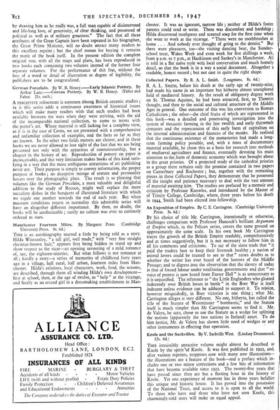THIS is an autobiography marred a little by being told
as a story. Hilda Winstanley, "a tall girl, well made," with "very fine straight chestnut-brown hair," appears first being bidden to stand up and show respect to the vicar—an opening savouring of a mild romance of, say, the eighteen-nineties. But what follows is not romance at all ; hardly a story—a series of memories of childhood forty years ago in a village, half rural, half urban, fourteen miles from Man- chester. Hilda's relations, local characters, work, food, the seasons, are described, through them all winding Hilda's own development— first at school, then, at the age of twelve, as " help " at the vicarage, .and finally as an errand girl in a dressmaking establishment in Man- chester. It was an ignorant, narrow life; neither of Hilda's foster parents could read or write. There was discomfort and hardship ; Hilda discovered toothpaste and scented soap for the first time when she went to work at the vicarage. "There were no toothbrushes at home . . . And nobody ever _thought of going to the dentist." But there were pleasures, too—the visiting dancing bear, the Sunday- school treat, Wakes Week and even work for five shillings a week, from 9 a.m. to 7 p.m., at Hankinson and Sankey's in Manchester. All is told in a flat naive style with local conversation and much homely detail, so that the book is in a way a social document. Altogether a readable, honest record ; but not cast in quite the right shape.






























 Previous page
Previous page